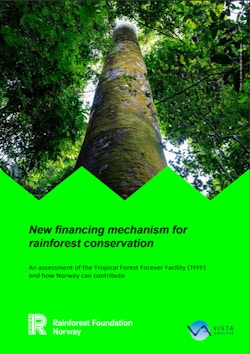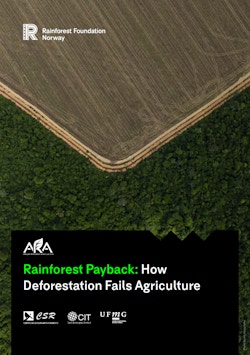Publications
Our annual reports and other publications.
Reports
-

Rainforest payback 2
This report looks at how forest destruction affects the regional climate, agricultural productivity, insurance payouts and public subsidies in the Amazon.
-

TFFF: New financing mechanism for rainforest conservation
An assessment of the Tropical Forest Forever Facility (TFFF) and how Norway can contribute.
-

State of Funding for Tenure Rights
The second State of Funding for Tenure Rights report provides an updated analysis of international donor funding for Indigenous Peoples, Local Communities, and Afro-descendant Peoples (IPs, LCs, and ADPs) in tropical countries from 2011 to 2024.
-

Driving change, not deforestation: How Europe could mitigate the negative impacts of its transport transition
The study examines the impact of increased demand for electric vehicles up to 2050 on deforestation.
-

Deforestation risk from Nordic alternative fuel policy
This report examines the biofuel policies of three Nordic countries, Sweden, Finland, and Norway. It looks at incentives for biofuel usage, environmental safeguards, consumption of biofuels and feedstock towards 2030 and possible links to deforestation. The report concludes with policy recommendations.
-

Rainforest payback: How deforestation fails agriculture
This study looks at how deforestation-induced local and regional climate changes affect agricultural production in the Brazilian Amazon.
-

Forest-risk Extractives: A Global Geospatial Analysis
Provides a comprehensive overview of the environmental risks posed by mining and oil & gas projects on global forest ecosystems. Using a geospatial analysis, the study examines the proximity of extractive assets to forests, highlighting the potential for deforestation and biodiversity loss. A valuable tool for financial institutions to understand their exposure to forest-risk extractive assets and mitigate the environmental impact of their investments in the sector.
-

PFAD-based biofuels
The report examines PFAD use in biofuels and concludes that this use will predictably lead to palm oil expansion, a recognised driver of tropical deforestation.
-

Short Circuits - Exploring the broken links of mineral supply chain policies in the electric vehicle industry
The report examines the due diligence policies and practices of key players in the electric vehicle (EV) industry on deforestation, biodiversity and Indigenous rights. The report found a disturbing lack of commitments on deforestation in mineral supply chains across EV battery producers and automakers alike and identified ‘broken links’ between automakers' and battery manufacturers' policies.
-

Hide on the Highway - Tracing Leather from Brazil to Europe under the EU Deforestation Regulation
The report maps the supply chain of Brazilian leather and its connection to end products in the EU. It reveals potential non-compliance with the EUDR, lack of transparency and difficulties in tracing the origin of the leather imported into the EU.
-

Proyectos REDD+ en la Amazonía Colombiana: Desafíos sociales y falta de transparencia
Este reporte presenta el panorama de los proyectos REDD+ en la Amazonia Colombiana. El reporte describe la ubicación y distribución de los proyectos REDD+ en territorios indígenas, así como los retos ambientales y sociales a los cuales se enfrentan.
-

REDD+ projects in the Colombian Amazon: Social challenges and lack of transparency
This report presents and overview of the REDD+ projects in the Colombian Amazon. It describes REDD+ project distribution in Indigenous territories, as well as some of the social and environmental challenges of their implementation.
-

RFN Solutions: Scaling up Support for Indigenous Peoples’ Rights and Actions to Protect their Forests
A presentation of our solutions for upscaling rainforest protection. This document provides an overview of investment opportunities to save the world's remaining large, contiguous rainforests. Our goal is a liveable climate and a world where biodiversity and the human rights of indigenous and forest-dependent peoples are upheld.
-

Neste, Biofuels and Environmental Risk. Briefing for investor engagement
We recommend that responsible investors engage Neste on sustainable and scalable biofuel production systems. This briefing gives an overview of Neste’s use of feedstocks for biofuels, a analysis of sustainability and business risk deriving from this, and recommendation for a sustainable reorientation of Neste’s business model.
-

The impact of a shift in global demand for leather on Brazilian slaughterhouses
Economic study of impact of shift in global demand for leather on Brazilian slaughterhouses. Prepared by NINT for RFN, February 2023.
-

The State of the Soy Industry
This report shows that the soy industry continues to cause rampant deforestation. A collaboration with Clean Harvest.
-
State of the Tropical Rainforest
This report is the world's first complete overview of the state of the tropical rainforest.
-
Driving deforestation: The European automotive industry's contribution to deforestation in Brazil
This report on the Brazilian leather industry reveals how it is highly likely that European car manufacturers contribute to deforestation of the Amazon.
-
Falling short
Despite their proven efficiency in protecting rainforests, IPLCs only receive a small share of funding for climate and biodiversity protection.
-
Deforestation tools assessment and gap analysis: How investors can manage deforestation risk
Systematic management of deforestation risks. Relevant tools & data gaps. Options for integrating deforestation data into ESG and risk analysis systems.
-
How the sausage gets made
This report reveals that a large share of the soy imported into Denmark by Danish Crown affiliates is not guaranteed deforestation-free.
-

Biofuel to the fire
The impact of global biofuel policies on tropical deforestation, with a focus on palm oil and soy-based biofuels. The conclusions are alarming.
-

Sustainable rainforest management in Acre
IPLCs & Brazilian state of Acre cooperate to find forest management strategies that protect rainforests & secure forest peoples’ rights and livelihoods.
-

Destination deforestation
Status review of aviation alternative fuel targets and discussion of deforestation risk associated with expanding biofuel use in aviation.























